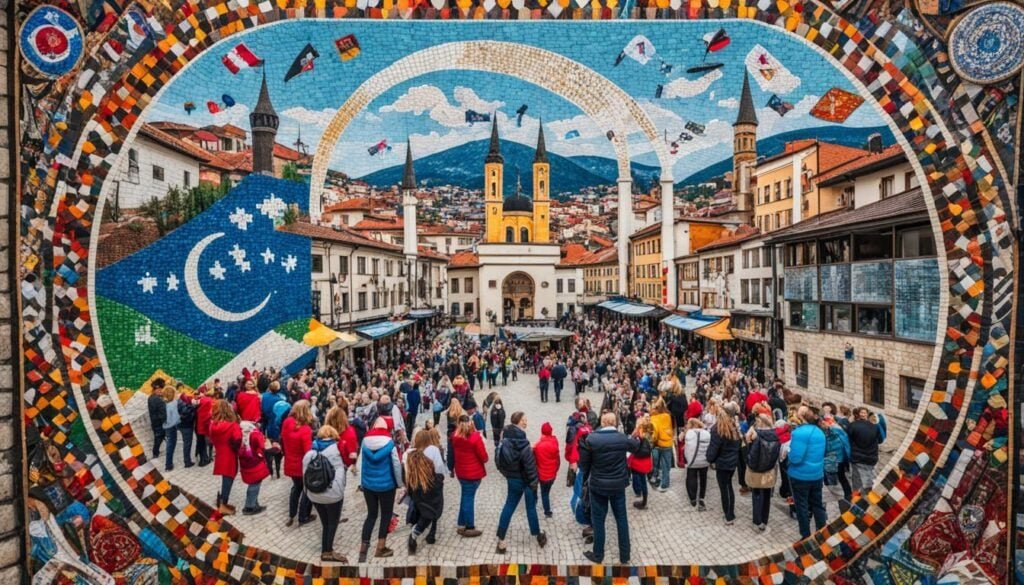
Ethnic and religious diversity of Bosnia: a tapestry of cultures
Bosnia and Herzegovina, a country nestled in the heart of the Balkans, is a vibrant mosaic of ethnicities, religions, and cultures. Its unique diversity stems from centuries of historical influences and a strategic location at the crossroads of East and West. This complexity has shaped the nation's identity, culture, and societal dynamics, making Bosnia a fascinating case study in multiculturalism, CE Report reports.
Ethnic Composition of Bosnia
Bosnia and Herzegovina is home to three primary ethnic groups:
Bosniaks
Bosniaks are the largest ethnic group in Bosnia, comprising about 50% of the population. Predominantly Muslim, their heritage reflects influences from the Ottoman Empire, which introduced Islam to the region in the 15th century. Today, Bosniak culture is characterized by its rich traditions in literature, music, and cuisine.
Croats
Croats, primarily Roman Catholic, make up around 15% of the population. Their culture is deeply connected to Western European traditions due to historical ties with the Austro-Hungarian Empire. Catholicism plays a central role in their identity, reflected in celebrations like Christmas and Easter.
Serbs
The Serbs, who are primarily Orthodox Christians, constitute approximately 30% of the population. Their culture draws heavily from Byzantine traditions, evident in their religious art, architecture, and festivals such as Slava, a unique Serbian Orthodox family celebration.
Religious Pluralism
Bosnia’s religious diversity is as significant as its ethnic variety, with Islam, Catholicism, and Orthodox Christianity being the dominant faiths. These religions coexist in the country, shaping its cultural landscape through places of worship, festivals, and traditions. Cities like Sarajevo are home to mosques, churches, and synagogues standing side by side, symbolizing a long history of interfaith coexistence.
Islam
Introduced during the Ottoman period, Islam is the faith of most Bosniaks. The Gazi Husrev-beg Mosque in Sarajevo, built in the 16th century, is a notable symbol of Islamic heritage.
Catholicism
Catholicism has deep roots in Bosnia, particularly among the Croats. Landmarks such as the St. James Church in Međugorje, a major pilgrimage site, reflect the faith's prominence.
Orthodox Christianity
The Serbian Orthodox Church has a profound influence on the country's spiritual and cultural fabric. The Church of the Holy Trinity in Banja Luka is one of the key centers of Orthodox worship.
Cultural Interactions and Challenges
The interplay of ethnic and religious identities has enriched Bosnia's culture, resulting in a blend of traditions, art, and gastronomy. However, it has also posed challenges. The country's history includes periods of conflict, particularly during the 1992–1995 Bosnian War, when ethnic divisions led to significant strife. Despite this, Bosnia has made strides toward reconciliation, with many initiatives aimed at promoting interethnic and interreligious dialogue.
Symbols of Unity
Despite its diverse makeup, Bosnia boasts numerous symbols of unity:
- Sarajevo: Known as the "Jerusalem of Europe," Sarajevo exemplifies coexistence, with its Old Town showcasing mosques, Catholic cathedrals, Orthodox churches, and a synagogue within walking distance.
- Traditional Cuisine: Bosnian cuisine, blending Ottoman, Austro-Hungarian, and Slavic influences, is a unifying factor. Dishes like ćevapi and baklava are cherished across all communities.
Looking Ahead
Bosnia and Herzegovina's ethnic and religious diversity is both a strength and a challenge. By embracing its multicultural heritage while addressing past wounds, the nation can serve as a model of coexistence. Its rich cultural tapestry offers lessons in resilience and the beauty of diversity.
Bosnia's story is one of complexity, resilience, and hope—a testament to the enduring human spirit in the face of history's trials.
Tags
Related articles
Most read


Press Releases






















